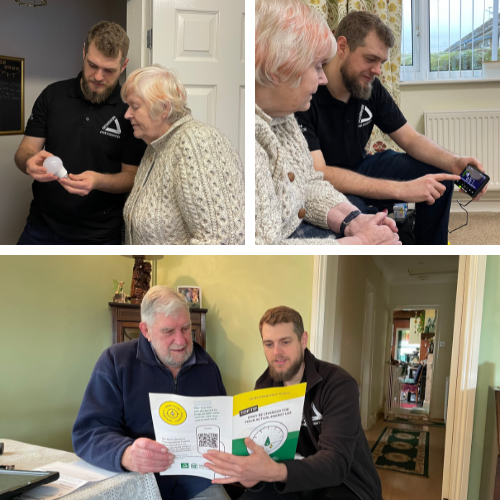Benefits of Energy Efficient Homes
Cost savings: Energy efficient buildings cost less to heat, cool and operate. Insulating your home, using energy efficient light bulbs, installing solar panels and heat pumps can all help to reduce energy use and lead to long-term savings.
Environmental benefits: Energy efficient homes don’t just reduce the amount of money you spend, they can also help to reduce the amount of carbon you use. Reducing energy use is a key tool in combating climate change and improving air quality.
Energy efficient homes are also better suited to transition to renewable energy, which produces less harmful emissions or none altogether.
Energy reliability: Energy efficient homes reduce the amount of electricity needed on the grid at one time. The less energy used, the more reliable and less congested the grid becomes, freeing up energy and leading to less disruption.
Health benefits: Clean air isn’t just good for the planet – it’s good for people. Energy efficient homes reduce the amount of fossil fuels needed to power our homes, leading to fewer emissions, less pollution and cleaner air for everyone.
Reducing your energy use at home
If your home isn't energy efficient, it is costing you money and wasting energy.
There are a number of ways you can reduce energy use in your home and save money on your bills:
- Change your energy tariff - register for the Energy Switch Scheme
- Sign up to a bulk buying scheme for heating oil
- Check if there is any help to pay your bill
- Understand your bill and consider having a smart meter installed
- Check your Energy Performance Certificate (EPC) if you home has one
- Insulate your home - loft, cavity wall or solid wall insulation
- Upgrade an old boiler and heating controls
- Install draught-proofing
- Replace windows and doors
- Buy energy efficient appliances
Smart meters
A smart meter is a new kind of gas and electricity meter that can digitally send meter readings to your energy supplier for more accurate energy bills.
Smart meters come with in-home displays so you can better understand and reduce your energy use. Every home in Britain should have been offered a smart meter from their supplier by 2020.
Visit the Citizens Advice website for more information about Getting a smart meter installed.
Smart Energy GB has more information about the benefits of smart meters and how they should be installed.
Energy Switch Schemes
Energy Switch Schemes helps residents use their combined buying power to join together to negotiate better deals for gas and electricity and save money on their bills.
The Lincolnshire Energy Switch scheme lets communities get cheaper gas and electric through an auction process. The more people who register before each auction, the bigger the potential savings.
Visit the Lincolnshire County Council website for information on how to Join the energy switch scheme.
Energy Saving Trust
Energy Saving Trust can give you information on all aspects of energy efficiency including insulation, heating systems, smart meters and energy efficient appliances.
Visit the Energy Saving Trust website for more information about energy at home.
Find ways to save energy in your home
If you own a property in England or Wales you can get recommendations for home improvements that could make your property cheaper to heat and keep warm. For each recommendation you can see:
- an estimated cost of making the improvement
- how much you could save on your bills
- next steps if you want to make the improvement
Visit Gov.uk to Find ways to save energy in your home
Citizens Advice
Citizens Advice provides information on how you can save money on your energy bills by finding ways to improve your home’s energy efficiency, including:
- Advice on saving money on your heating
- Ways to save money using your electrical appliances
- The risks of spray foam insulation; and
- What to do if you rent privately or live in social housing
Visit the Citizens Advice website to find out more about how to Make your home more energy efficient
Groundwork - Green Doctors
Groundwork offers free energy assessments and a range of practical advice and support through their free Green Doctor service.
Green Doctors are trained energy-efficiency experts that aim to help residents of East Midlands reduce energy waste in their homes and take control of their bills.
This is a free service for all East Midlands residents and can provide support you if you are struggling to pay bills or manage fuel debt, concerned about your home being cold, damp or draughty, worrying about choosing between eating or heating, or have respiratory problems, permanent health conditions or a terminal illness. Households can save £325 per year, on average, by following the advice of a Green Doctor.
You can sign up for this service for yourself or refer someone else by using the online form, or by emailing greendoctor@groundworknottingham.org.uk or call 0115 9788212 (Monday – Friday, 9am – 5pm).
More information can be found on the Groundwork website.


